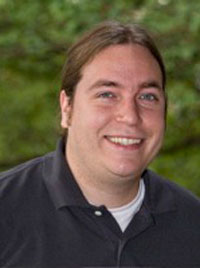Sept. 4, 2009
For Immediate Release
Campbellsville University to Hold Chemistry Seminar on ‘Synthetic Heterocycles and their Applications in Energy and Advanced Electronics’ Sept. 11
By Joan C. McKinney, news and publications coordinator
 CAMPBELLSVILLE, Ky. – Dr. Nathan Tice, assistant professor of organic chemistry at Eastern Kentucky University, will present the first chemistry seminar of the semester Friday, Sept. 11 at Campbellsville University.
CAMPBELLSVILLE, Ky. – Dr. Nathan Tice, assistant professor of organic chemistry at Eastern Kentucky University, will present the first chemistry seminar of the semester Friday, Sept. 11 at Campbellsville University.
Tice will speak on “Synthetic Heterocycles and Their Applications in Energy and Advanced Electronics,” at 10 a.m. in room 15 of the Administration Building, 104 University Drive, Campbellsville.
Tice’s seminar will focus on the role of heterocycles in electronic devices, previous research on electronic materials containing heterocycles and synthetic pathways being currently investigated for the formation of heterocyclic derivatives.
Tice has a Ph.D. in organic chemistry from the University of Kentucky. He has a bachelor of arts from Anderson University.
He has served in his present position at EKU since August 2008. He was a post-doctoral research associate in biomass chemistry, Forest Products Center, University of Tennessee in Knoxville, Tenn., from January 2007 to June 2008.
Tice’s research primarily focuses upon the synthesis and reactivity of heterocycles and their fused-ring aromatic analogs for incorporation into electronic devices. ?
While there has been some investigation into the organometallic and material chemistry of these heterocycles, this still represents a rich area of research, which has the potential for transition metal-mediated coupling, polymerization, and electrochemical studies. Research from the Tice group focuses on applications in next generation electronics, alternative or “Green” energy, and development of high-value materials from the emerging biorefinery sector.
Students engaging in this research will learn hands on, synthetic techniques in organic and organometallic chemistry as well as applications in solution and solid-state spectroscopy and characterization including NMR, IR, MS, UV-Vis, and X-ray diffractometry, according to Dr. Chris Mullins, assistant professor of chemistry at Campbellsville University. ??
Campbellsville University is a private, comprehensive institution located in South Central Kentucky. Founded in 1906, Campbellsville University is affiliated with the Kentucky Baptist Convention. Listed in U.S.News & World Report’s 2010 “America’s Best Colleges,” CU is ranked 23rd in “Best Baccalaureate Colleges” in the South and fourth in “up-and-coming” schools in the south. CU has been ranked 17 consecutive years with U.S.News & World Report. The university has also been named to America’s Best Christian Colleges® and to G.I. Jobs magazine as a Military Friendly School. Campbellsville University is located 82 miles southwest of Lexington, Ky., and 80 miles southeast of Louisville, Ky. Dr. Michael V. Carter is in his 11th year as president.
-30-
